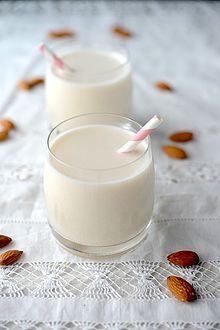
Back Amandelmelk Afrikaans حليب اللوز Arabic বাদাম দুধ Bengali/Bangla Llet d'ametlla Catalan Llaeth almon Welsh Mandelmælk Danish Mandelmilch German Γάλα αμυγδάλου Greek Migdallakto Esperanto Leche de almendra Spanish
 | |||||||
| 15 kcal (63 kJ) | |||||||
| |||||||
Almond milk is a plant-based milk substitute with a watery texture and nutty flavor manufactured from almonds,[1] although some types or brands are flavored in imitation of cow's milk.[2] It does not contain cholesterol or lactose and is low in saturated fat. Almond milk is often consumed by those who are lactose-intolerant and others, such as vegans, who avoid dairy products. Commercial almond milk comes in sweetened, unsweetened, vanilla and chocolate flavors, and is usually fortified with micronutrients. It can also be made at home using a blender, almonds and water.[3][4]
Global almond milk sales in 2018 were US$5.8 billion, growing at 14% per year, and forecast to be a $13 billion global market by 2025.[5]
- ^ Lincoln, Jamie (18 August 2016). "Ditching Dairy? Here's a Cheat Sheet to the Tastiest Milk Alternatives". Vogue. Retrieved 8 February 2018.
- ^ "Face Off: Almond Milk vs. Soy Milk". Geri Maria Harris. Houston Press.
- ^ Larmer, Christina (9 January 2011). "The pros and cons of almond milk". Adelaide Now. Archived from the original on 18 August 2016.
- ^ "Mayo Clinic Q and A: Dairy milk, soy milk, almond milk — which is the healthiest choice for you?". Mayo Clinic. Retrieved 1 September 2021.
- ^ Anna Starostinetskaya (23 June 2019). "Almond milk market to be worth $13.3 billion by 2025". VegNews, Fresh Healthy Media. Retrieved 27 September 2019.
© MMXXIII Rich X Search. We shall prevail. All rights reserved. Rich X Search